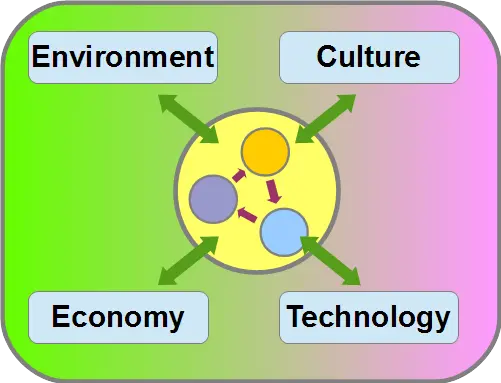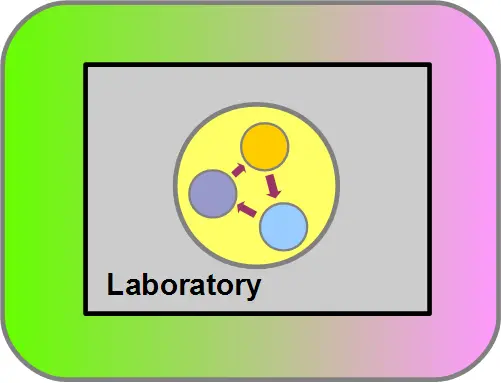Applied Complex Systems Science
Mission statement
ACSS is a research group devoted to the study of complex socio – technological systems. We employ a variety of mathematical and physical tools with a focus on statistical mechanics, artificial intelligence, bio – inspired and evolutionary engineering. We believe that bringing modern mathematics into the realm of engineering is key to the development of the Swiss economy and the progress towards a sustainable and human – centered technology.
Our main aspiration lies in applications. To us, the usual distinction between fundamental and applied sciences implies that in fundamental sciences, the internal workings of a system are studied under laboratory, means deliberately simple conditions. Applied sciences focus on the question how these systems interact with a more complex environment and how knowledge about these interactions can be exploited in an industrial and/or societal setting.
We are convinced that the development of science and technology is an interactive process. This means that on one hand, science advances all sorts of human endeavors. On the other hand, the contact with real – world problems guides the development of methods and concepts into novel and fertile areas. True inter- and transdisciplinarity is still in its beginnings. This is not only about science; in ACSS, we have learned that communication beyond the borders of the narrow scientific and technological communities requires novel types of knowledge management.
Models and Simulations
Models play an important role in our studies. However, one has to be aware of the question what exactly it is that can be learned from a simulation. Simulations may serve multiple purposes:
- Check your understanding of the past
- Optimize the present
- Predict the future if you know the present
- Estimate the future if you guess the present
- Explain what we see: Transform data into meaning
- Produce data and train modern controllers (e.g. deep neural nets)
- The non – ideal world: Dealing with fluctuations
- Find your weaknesses, identify your strengths
ACSS does not stand alone. We are member of various platforms and strongly believe in the fundamental shift in scientific practice caused by the rise of data science. ACSS is very active in the ZHAW datalab and is founding member of the digital health lab.
Areas of Competence
- Model reduction and phenomenological modeling in technology, social sciences and management
- Application of machine learning and artificial intelligence
- Spatially heterogeneous chemistries / bio – inspired chemical process mangament
- Biologically inspired approaches in engineering, especially evolutionary methods
- Modeling of deterministic and stochastic hybrid models
- Physically inspired optimization
- Application of formal languages and functional programming
- Efficient science communication
Talks and Presentations
- Applied Complex Systems Sciences(PDF 5,4 MB)
- Evolution als Werkzeug(PDF 5,1 MB)
- Morphological Control: Applied embodied intelligence in mechanical and biological systems offering new perspectives to creativity support systems(PDF 10,0 MB)
- Morphological Control: Applied embodied intelligence in Medicine, Robotics and IT(PDF 6,9 MB)
- Morphological Control as guiding principle in physiology and medical applications(PDF 6,6 MB)
- Morphologcal Computation: a not so usual point of view in health care(PDF 10,0 MB)
- Models and Simulation in Business: Understand the past - optimize the present - prepare the future(PDF 1,4 MB)
Methods
- Object-oriented modeling, semantic and syntactic model reduction
- General methods form complex systems science (complexity measures on time series, dynamics of large reaction networks, multiscale modeling)
- General machine learning (RL, deep learning, etc.)
- Applied statistical mechanics
- Physically inspired optimization (simulated annealing, etc.)
- Stochastic differential equations
- Thermal Design (finite time thermodynamics and second law optimization)
- Evolutionary engineering (EA, EP, GA, GP, hybrid methods)
- Application of dynamical systems theory (especially delay equations)
- Formal languages for efficient systems description
- Blockchain technologies
- Mesoscopic simulation methods (multipolar dissipative particle dynamics)
- Theory of narratives in the context of natural science
Team
Group leader:
Füchslin Rudolf, Prof. Dr.
Team:
Aryananda Blatter Lijin, Dr.
Bolt Peter
Eggenberger Hotz Peter, Dr.
Enayati Aref
Fischetti Giulia, PhD Student
Flumini Dandolo, Dr.
Henrici Andreas, Dr.
Herzig Ivo
Jaeger Christian, Dr.
Lichtensteiger Lukas, Dr.
Mingo Barba Sergio, PhD Student
Robbiani Marcello, Prof. Dr.
Schmid Nicolas, PhD Student
Schneider Johannes, Dr.
Weyland Mathias, Dr.
Zaugg Christoph, Dipl.-Math.
Ziebart Volker, Dr.
Selected Current Projects
Selected Older Projects
- DIR3CT
- Analysis of complex socio – technical systems (e.g. model supported stochastics power load in energy supply)
- FairCapital
- Systems science in medicine
- Pandemics
- Time series analysis
- Novel types of processing platforms in spatially resolved chemistries
- Combined energetic and entropic optimization in energy management (thermophotovoltaics, finite time thermodynamics)
- Therapy optimization in oncology (synergistic therapies hyperthemia/radiotherapy)
- Mesoscale simulation of cellular processes
- Application of machine learning in industrial contexts
- Model supported applications of AI, e.g. in HVAC - systems
- Morphological computing / soft robotics
- Synchronization phenomena in dynamical systems
- Applied stochastic differential equations
- Narratives as tool in science education
- Model predictive control in facility management
- Phenomenological simulation of granular matter in industrial processes (e.g. optimization of sieving machines)
- Calculation of mechanical lock system

